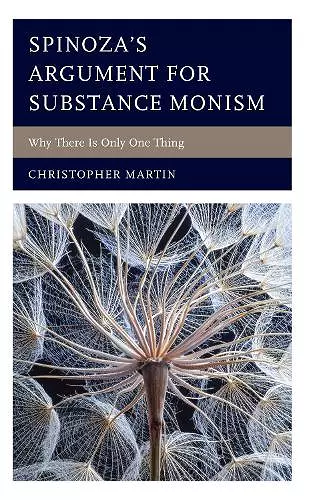Spinoza’s Argument for Substance Monism
Why There Is Only One Thing
Format:Hardback
Publisher:Bloomsbury Publishing PLC
Published:15th Nov '23
Currently unavailable, and unfortunately no date known when it will be back

In Spinoza’s Argument for Substance Monism: Why There Is Only One Thing, Christopher Martin provides an interpretation and defense of this argument, using speculative metaphysics as a method to show how the key terms and concepts are employed and fit together. Specifically, Martin argues that (i) Spinoza’s understanding of substance and attribute departs only slightly from dominant historic notions; (ii) his definition of God in terms of attributes instead of perfections is quite helpful and (mostly) compatible with more traditional definitions; and (iii) Spinoza’s pairing of causal and conceptual relations is more intuitive than we think. Martin also shows how these essences function as causes and explains why, with Spinoza’s understanding of emanation and conceptual independence, any substance must have every attribute. These features of Spinoza’s argument explain and defend his ultimate claim that God/Nature is the only substantial being in existence. This book demonstrates how approachable and compelling Spinoza’s argument is and illustrates the practice and potential of speculative metaphysics for specialists and non-specialists alike.
In this slim monograph Martin tackles a difficult question confronting the reader of Baruch Spinoza’s masterwork Ethics: why must God be the only substance, and all other things (including oneself) merely modes or properties of God? Martin helpfully summarizes some longstanding debates in the analytic philosophical scholarship surrounding this question, including the subjective and objective interpretations of the attributes of substance, and whether Spinoza might conceive of modes as properties or “quasi-substances.” Martin develops an interpretation in which substance emanates modes—producing and sustaining them without altering or diminishing its own being. Modes should be understood as modifications of an underlying field, analogous to conceiving of matter as a modification of space. Recommended. Lower- and upper-division undergraduates; graduate students; researchers and faculty. * Choice Reviews *
In Spinoza’s Argument for Substance Monism: Why There Is Only One Thing, Christopher Martin deploys the notion of conceptual independence and the principle of sufficient reason in development of a distinctive critical analysis of Spinoza’s argument for substance monism that engagingly unfurls the complexity, audacity, and grandeur of Spinoza’s thought. -- Matthew Homan, Christopher Newport University
Martin’s book is simultaneously a lucid introduction to Spinoza’s metaphysics and an exciting contribution to the scholarship on Spinoza’s substance monism. The core of this book is a compelling reconstruction and defense of Spinoza’s argument that there is only one fundamental being in the cosmos. Yet it is also a testament to the enduring power of Spinoza’s philosophical method. Martin makes a forceful case for treating Spinoza’s ideas not merely as relics of the history of thought, but as philosophical possibilities that we must contend with even today. -- John Grey, Michigan State University
In this valuable book, Martin brings a clear voice and vision to one of the most vexing arguments in seventeenth-century philosophy. Balancing a conversational tone with deep knowledge of the historic and scholarly context, Martin methodically lays out, explains, and defends Spinoza’s argument for substance monism. As he proceeds, Martin considers tricky concepts and arguments in sophisticated, but accessible, ways that will be of interest to both students and specialists. Spinoza’s Argument for Substance Monism is an excellent resource for understanding this component of Spinoza’s philosophical system and might just convince you that there is only one substance. -- Thaddeus Robinson, Muhlenberg College
Christopher Martin’s remarkably lucid book gives anyone curious about Spinoza’s Ethics the background needed to appreciate some of the most important arguments in that famously forbidding work. I will enthusiastically recommend it to all my students and will be giving it to family members who have been wondering for years what I spend a lot of my time thinking about. -- Kristin Primus, University of California, Berkeley
ISBN: 9781666927146
Dimensions: 237mm x 158mm x 17mm
Weight: 390g
134 pages